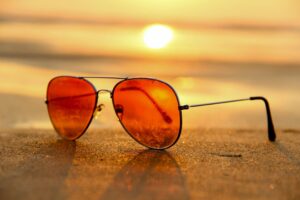Countdown to the Spectacle Solar Eclipse
In just a fortnight, stargazers and astronomy enthusiasts will seize the chance to witness one of the most eagerly awaited celestial events of the year. Corpus Christi, although not directly in the path of totality for this rare solar eclipse, promises residents and visitors a breathtaking view. Yet, amidst the growing excitement, healthcare experts send out a critical reminder: the importance of eye safety is paramount.
A Word of Caution from Health Professionals
Dr. Heriberto D. Ramos, a distinguished optometrist, highlights the potential hazards of exposed eclipse viewing. “Taking even a brief glimpse of the eclipse might seem innocuous, yet I strongly advise against it,” Ramos cautions. The risks of direct eclipse observation might not be immediately evident, but the consequences are profound and enduring.
Understanding the Risks
The primary risk involves permanent damage to the macula, the segment of the eye crucial for direct vision. “Direct exposure to the eclipse can effectively burn the retina’s back,” Ramos reveals. In his extensive practice, he often finds that individuals under 30 are most susceptible to eclipse-related eye injuries. “About a dozen patients last year reported possible eye damage after observing the eclipse, noticing that something felt amiss,” he recounts.
The aftermath of such exposure isn’t just immediate; it bears the potential for lifelong impact. “Regrettably, eye damage from a solar eclipse results in permanent, irreversible harm,” Ramos underscores, emphasizing the critical nature of protective measures.
A Historic Event in Texas
The anticipation for the upcoming solar event is palpable, not least due to its historic significance. It’s been nearly 150 years since Texas last found itself under the path of a total solar eclipse on July 29, 1878. It makes the upcoming event, scheduled for April 8, an exceedingly rare spectacle for the state. Galina Reid, a physics professor at Texas A&M University-Corpus Christi, notes, “The complete obscuration of the solar disk by the lunar disk is a phenomenon we shall witness, much like last year’s annular eclipse, yet unique to the Northern Hemisphere.”
Safeguarding Your Vision From Solar Eclipse
With such a monumental occasion on the horizon, the excitement is understandable. However, both healthcare and academic professionals urge caution. “I would not recommend observing the eclipse without specialized protective eyewear designed to filter out harmful rays,” Ramos advises. Securing eyewear approved by the American Astronomical Society (AAS) is crucial for those looking to safely partake in the event, as these glasses are specifically designed to shield the eyes from the sun’s damaging rays.
Community Anticipation and Responsibility
As the eclipse draws near, the community’s enthusiasm is evident, with schools, local astronomy clubs, and other organizations gearing up for viewing parties and educational events. Nevertheless, amidst all the excitement, the overriding message is clear: eye protection is non-negotiable. Taking the proper precautions ensures that this celestial event remains a safe, enjoyable, and memorable experience for all participants.

